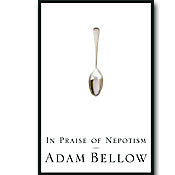
Nepotism in many ways is like its furtive sibling, onanism: a practice that people are irresistibly compelled to indulge in, and one that gives them great satisfaction, but one in which no one can take public pride. Neither one is wrong, exactly—but that doesn’t make them right. And either one, practiced in excess, is said to produce a certain narcissistic enervation.
In his new book, In Praise of Nepotism, Adam Bellow attempts to turn this not-quite-sin into a not-quite-virtue. Coming as it does from the son of a towering genius of American literature, a book called In Praise of Nepotism is a provocative, prove-me-wrong one-liner to what must have been a constant question, spoken or unspoken: Why should he receive special treatment?
First of all, because he can. The subtitle of the book is A Natural History, which is a currently fashionable accessory—think Steven Pinker or Diane Ackerman—for a book about what makes us human. The strongest argument Bellow musters for nepotism is that it’s so ingrained as to be irresistible, so why not just lie back and enjoy it? In a sense, it’s a conservative reworking of the sixties mantra “If it feels good, do it.”
Actually, though, the book is far from flippant. Armed with a definition of nepotism so capacious that whatever sordid taint the word had is so diluted as to be barely detectable, Bellow explores the factors by which some families travel from shirtsleeves to shirtsleeves in the proverbial three generations while some, like the Borgias of Renaissance Florence, say, or the mercantile families who dominated Boston from the revolution until well into this century, manage to preserve their forces and finances over several generations.
For much of its 500 pages, In Praise of Nepotism isn’t an argument at all but a sprawling, digressive study of comparative dynasty. In the preface, Bellow shrewdly pleads amateurism. The book is a historical hit parade, a long, odd, obsessive survey of familiar ground—we get Jesus, Napoleon, Caesar, George Washington, Lincoln, Roosevelts, and Kennedys—from a surprising, if not uniformly enlightening, vantage point.
“Bellow is too fair and balanced, too temperate, too conscientious, too moral to give it much heat.”
A defense of nepotism has to be an argument about culture, about the values that a large, durable family can propagate, or at least the great art that it can commission. Bellow, however, is a highly reluctant defender of aristocratic values. The general historical movement has been from the mysteries of blood to bloodless bureaucracy and the modern idea of advancement based on merit. Bellow sees the American meritocracy itself becoming increasingly nepotistic and inbred, a development he greets with—typically mild—applause for rubbing off the meritocracy’s callow, grasping edges. At least the nepotist is grasping for someone else: the children.
Oedipus is present—he wouldn’t miss a patrilineal party like this—but he’s hard to recognize in his academic robes. Much of the quarreling between the fathers who won’t let go and the children who won’t obey takes place offstage. One of nepotism’s most salutary cultural effects, and one that Bellow fastidiously avoids taking any pleasure in, has to do with drama, the spectacle of watching great families come apart, as the sins of the fathers are paid for by the sons—the house of Atreus, or Kennedy, or Cuomo. Nepotism is about being known, and being known is being measured, and being envied.
Bellow largely sublimates the primal conflict between father and son—albeit in plain sight. He dedicates In Praise of Nepotism to “all my fathers,” and in so doing he throws in his lot with the idea of the good father, but not exactly the reality. In the acknowledgments, his actual father is thanked thus: “Saul Bellow, who gave me his name, his genes, and a legacy to live up to.”
It’s a heavy burden, and in In Praise of Nepotism one sees Bellow struggling with it. This is nepotism’s eye-for-an-eye, the flip side of privilege, although of course it’s unfair to judge Bellow by the standards of his illustrious ancestor (and what a burden it would be to be the child of a genius—it’s not the sort of thing you can pass on).
This is an interesting book, but once the title’s frisson has dissipated, it can move a little slowly. Bellow’s final peroration on the virtues of hiring one’s cousins and the uses and abuses of nepotism is well-delivered, but it’s not a speech that’s liable to generate much fervor. Essentially, In Praise of Nepotism is an argument for the status quo, and Bellow is too fair and balanced, too temperate, too conscientious, too moral to give it much heat. It’s a second-generation problem.
Books & the Mix Listings
• Readings
• Lectures
• More in Books and the Mix